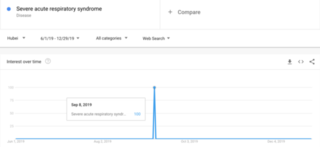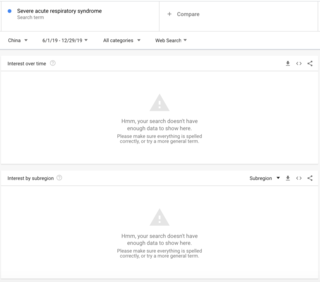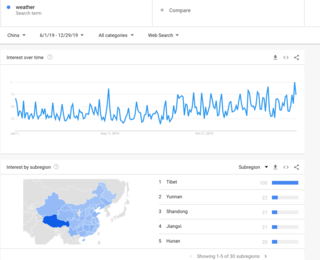Coronavirus Disease 2019
The Mysterious Disappearance of Key COVID-19 Timeline Data
Google search statistics on COVID inexplicably vanish after a recent blog post.
Posted July 12, 2020
Mysterious blips: something's there
In early May of this year, I published a blog post showing that, in Hubei province (Wuhan's location) and in Beijing (the Chinese capital), there were a cluster of Google searches on the “Severe Acute Respiratory Syndrome” (SARS: a previous coronavirus) and on “Coronavirus” in September and October 2019 respectively, months before COVID-19 burst on the world stage in late December.
Here is one of the graphics I posted, describing Google search volume for “Severe Acute Respiratory Syndrome”

I found similar spikes for “Coronavirus” for both Google and Wikipedia searches in September/October 2019, hinting—but not proving—that someone, somewhere had elevated curiosity about SARS and Coronavirus before the rest of the world knew these subjects were important.
By themselves, these spikes in search interest don't prove anything, but in June of this year, ABC News followed up with a piece describing research on satellite imagery of Wuhan at Harvard Medical School indicating that traffic around five Wuhan hospitals dramatically increased “in late summer and early fall” of 2019.
“Late summer and early fall” do coincide exactly with search interest spikes I found—both on Google and Wikipedia—for terms related to the virus.
Fast forward to today: something's missing
Yesterday, as my wife Chris Gilbert (a collaborator and fellow Psychology Today blogger) were preparing to appear on a radio show to talk about these findings, we revisited our earlier exploration of Google search data, only to find that it had somehow vanished.
Here is an example of what we saw (or rather didn't see) when we repeated the search for “Severe Acute Respiratory Syndrome.”

The only difference in the search results to the left from our original search is that we called up results for all of China, not just Hubei province, because, unlike our original search, where data were abundant for multiple Chinese provinces, there were no provincial data at all, and, as you can see, no data for China as a whole either.
Our repeat exploration of Wikipedia search data on COVID-19 related searches, however, yielded exactly the same results as our May search: COVID-related spikes in both September and October 2019.
What does it all mean?
One possibility about what (or who) made the data disappear grows out of an old adage in the intelligence business, in which I used to work: "When you peer into the abyss, the abyss looks back at you!” Perhaps people who weren't thrilled about this information concerning the early stages of the pandemic coming out saw my post and/or the ABC News piece and somehow managed to remove the evidence before it could cause further embarrassment.
But as with our original findings, it's important not to jump to conclusions, because there could be alternative explanations for the phenomena we discovered.
For instance, what if Google, unlike Wikipedia, routinely “ages” off search statistics over time, making historical records unavailable as time passes?
To explore this hypothesis, we ran searches over the same period for neutral terms such as “weather” (in both English and Mandarin) and found the following:

As you can see, Google did not routinely “age off” search statistics for the period in question: Data are abundantly available not only for China as a whole, but also for all of its provinces (shown in bottom half of chart). Search data remain available for a wide range of other “neutral” terms ranging from “water” to “Pokemon.”
The bottom line
Even though historical COVID-related Google searches seem to have been treated very differently than other searches, we can't say with certainty there was a deliberate attempt—by someone—to suppress potentially embarrassing information. Thus, as journalists, Chris and I will continue to unearth data that would either support or contradict the hypothesis that someone, somewhere managed to remove intriguing search statistics for reasons known best to them.
But we have dug up enough evidence for you to start to form your own conclusions.
So....what do you think?


